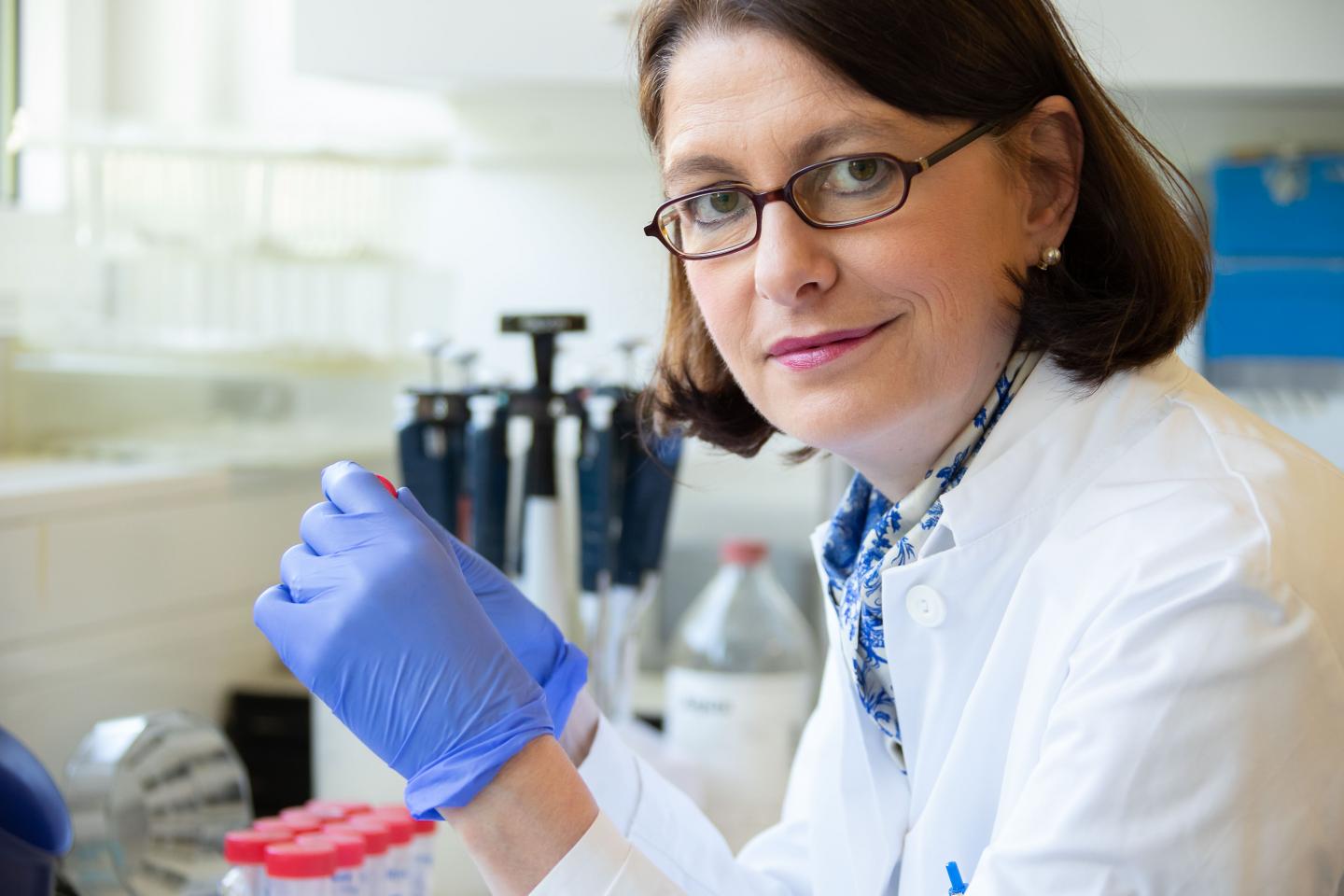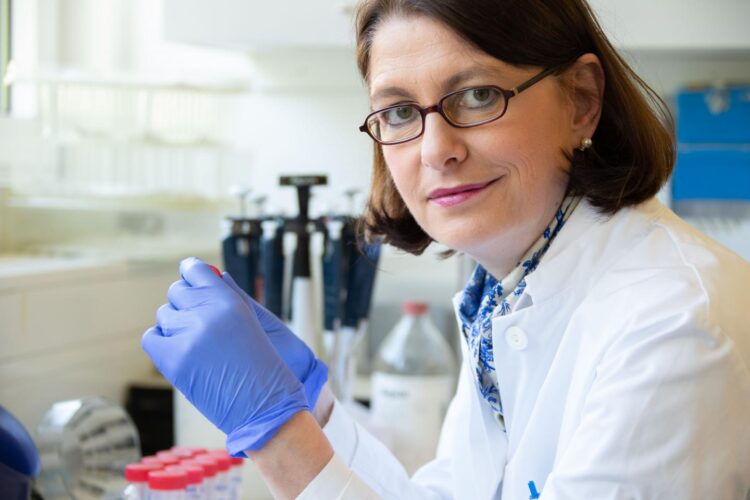
Credit: Rüdiger Koop, UKS
The new procedure will help to meet the high demand for testing in the mass coronavirus screening programmes needed in the early identification and isolation of asymptomatic individuals. The pooling of samples before testing is a well-established and safe procedure in blood banking. The team from the Institute of Virology has adapted and tested this method for use in coronavirus diagnostics.
Samples from several individuals are pooled and tested together in a single tube using sensitive molecular biological detection methods. Only if the pool result is positive do the samples need to be tested individually. When the infection rate is low and only a few people are infected, pool testing can significantly expand the testing capacity of the existing laboratory infrastructure. The team has been using the new procedure at Saarland University Hospital in Homburg since mid-March to successfully protect vulnerable patients from infection by asymptomatic SARS-CoV-2 carriers. The success of the pool testing procedure has now led to its use in screening residents and staff at nursing and residential care homes in Saarland.
‘To protect those groups with a high mortality risk from the coronavirus, we need to prevent the introduction of the virus from asymptomatic individuals, including the medical and care staff that look after them. Groups most at risk include chronically ill hospital patients, such as those with cardiovascular disease or cancer, the elderly and, most especially, the residents of nursing homes and residential care homes. Prevention is only possible if we use large-scale testing to identify asymptomatic contact persons and thus avert infection of the most vulnerable,’ says Sigrun Smola, Professor of Virology at the Saarland University and Director of the Institute of Virology at Saarland University Hospital. Up until now, it has not been possible to scale up mass screening programmes, as there was simply not enough testing capacity in the diagnostic labs.
‘Early on in the pandemic, we started to explore whether the pool testing approach used in blood banking could be adapted to increase testing capacity in coronavirus diagnostics,’ explains Professor Smola. In early March, the Homburg research team developed a testing protocol that involved pooling corona swabs from medical staff showing no clinical symptoms and then analysing the pooled sample. ‘Our molecular biological test method (RT-PCR) was so sensitive that we were able to combine samples from up to 30 individuals in a single test tube. Even if only one person in that group of thirty was infected, we still obtained a positive result for the pooled test. If a pool had a positive result, we then conducted a second phase of testing on the individual samples to identify the infected person or persons. If the rate of infection is low and if many of the pools are negative, this can save significant numbers of test kits and increase the test capacity of the existing infrastructure’ explains Sigrun Smola.
Viral infections are particularly challenging as infected individuals can be contagious before developing clinical symptoms such as a sore throat, cough or pneumonia. The literature shows that individuals can spread the coronavirus two days before the onset of clinical symptoms. Viral load is at its highest and the infected individuals are highly contagious almost a day before any symptoms become apparent. As some individuals do not develop further symptoms, but remain contagious for some time, it is crucial that these asymptomatic and presymptomatic patients are identified, as this allows us to detect infection ‘hot spots’ early on and to isolate infected individuals effectively so that we can break the infection chain.
In a concerted action with the Saarland Ministry of Health, the pool testing procedure developed in Homburg is now being used to screen residents and staff at 131 nursing and residential care homes in Saarland in order to protect the vulnerable elderly groups in these institutions who are most at risk from coronavirus infection. Around 22,000 people will be tested as part of the screening programme – an enormous logistical challenge requiring a huge collaborative effort involving numerous partners. ‘Our mass screening campaign is a unique cooperation involving the Fraunhofer Institute for Biomedical Technology IBMT, the Helmholtz Institute for Pharmaceutical Research Saarland HIPS, the Saarland Consumer Protection Office (Landesamt für Verbraucherschutz ) and the Saarland Care Providers Association (Saarländische Pflegegesellschaft), with the Blood Donation Centre Saar-Pfalz gGmbH offering back-up lab,’ explains Professor Smola.
‘We have also received numerous urgent inquiries from hospitals in Germany and abroad, as testing capacity limitations are proving to be a critical issue at this moment,’ says Smola.
The practical significance of the Homburg procedure in helping to combat the coronavirus pandemic is reflected in the paper ‘Pooling of samples for testing for SARS-CoV-2 in asymptomatic people’, which has been published in the highly respected medical journal ‘The Lancet Infectious Diseases‘. In addition to Professor Dr. med. Sigrun Smola and her team Dr. Stefan Lohse, Dr. Thorsten Pfuhl, Dr. med. Barbara Berkó-Göttel and Dr. med Jürgen Rissland, others involved in the work included Tobias Geißler from the Department of Anaesthesiology, and Professor Dr. med. Dr. phil. Sören Becker, Professor Dr. med. Barbara Gärtner and Dr. med. Sophie Schneitler from the Institute for Medical Microbiology and Hygiene at Saarland University Hospital.
###
Original Publication:
‘Pooling of samples for testing for SARS-CoV-2 in asymptomatic people’ in The Lancet Infectious Diseases:
http://www.thelancet.com/journals/laninf/article/PIIS1473-3099(20)30362-5/fulltext
Questions can be addressed to:
Univ.-Prof. Dr. med. Sigrun Smola
Institut für Virologie
Universitätsklinikum des Saarlandes
Email: [email protected]
Tel. +49 (0)6841 16-23931
Media Contact
Friederike Meyer zu Tittingdorf
[email protected]
Related Journal Article
http://dx.





